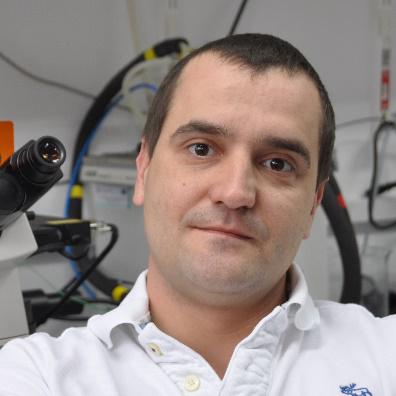


Droplet microfluidic systems use microdroplets as miniature reactors and embody the most acclaimed promises of microfluidics: ultra-miniaturisation and throughput. The exquisite control over the micro-reactors is based on the characterization of the fundamental processes of generation and transport of droplets in microchannels. Construction of microfluidic tools for research in chemistry and microbiology requires the additional engineering of automation.
We will demonstrate systems that are remarkably simple in contrast to the complexity and scaling of the number of processes that they perform. We developed a technology for handling processes in microdroplet reactors that provides the flexibility of standard glassware for chemists. In particular, it is possible to i) produce hundreds of individual microdroplet reactors and address each one individually; ii) manipulate the chemical environments of the microdroplet reactors in time and over prolonged intervals; and iii) monitor the chemical processes in each of the microdroplets in parallel.
We will also describe a class of micro-droplet systems that are almost completely passive in the sense that they do not require precise control in order to execute precisely even complex protocols. The combination of the automation and the passive modules allows for expanding the range of applications in chemistry, biochemistry and microbiology. I will present a range of applications ranging from optimization of reaction conditions, incubation of microorganisms and studies of emergence of drug resistance, determination of solubility diagrams of proteins and studies of electrical measurements of transport through membrane proteins.



Droplet microfluidic systems use microdroplets as miniature reactors and embody the most acclaimed promises of microfluidics: ultra-miniaturisation and throughput. The exquisite control over the micro-reactors is based on the characterization of the fundamental processes of generation and transport of droplets in microchannels. Construction of microfluidic tools for research in chemistry and microbiology requires the additional engineering of automation.
We will demonstrate systems that are remarkably simple in contrast to the complexity and scaling of the number of processes that they perform. We developed a technology for handling processes in microdroplet reactors that provides the flexibility of standard glassware for chemists. In particular, it is possible to i) produce hundreds of individual microdroplet reactors and address each one individually; ii) manipulate the chemical environments of the microdroplet reactors in time and over prolonged intervals; and iii) monitor the chemical processes in each of the microdroplets in parallel.
We will also describe a class of micro-droplet systems that are almost completely passive in the sense that they do not require precise control in order to execute precisely even complex protocols. The combination of the automation and the passive modules allows for expanding the range of applications in chemistry, biochemistry and microbiology. I will present a range of applications ranging from optimization of reaction conditions, incubation of microorganisms and studies of emergence of drug resistance, determination of solubility diagrams of proteins and studies of electrical measurements of transport through membrane proteins.